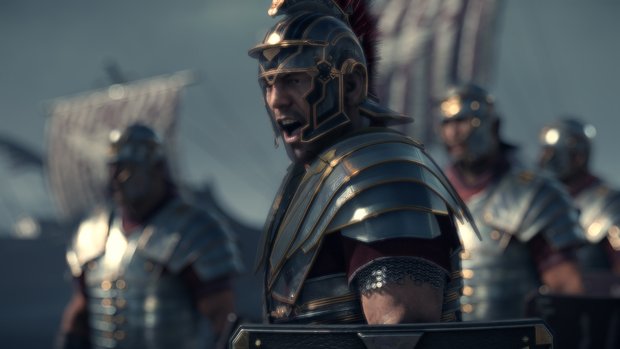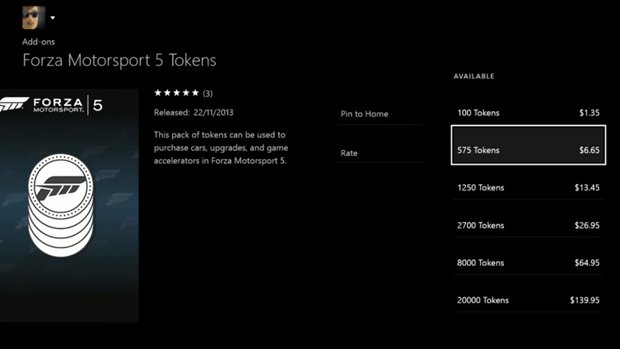Xbox One's launch exclusives foreshadow a dystopian future for microtransactions
Last week, Avalanche Studios founder Christofer Sundberg tweeted that "Micro-Transactions, subscriptions and other biz models will be the next generation of games. It is that simple." I understand why he feels that way--developers are looking at wildly lucrative F2P giants like League of Legends and World of Tanks and hoping to find a way to dive in. But unless the console market adjusts, it's not going to be able to make this work, because so far, console gaming has fucked this up tremendously.

My first taste of the next generation of consoles holding me upside down and shaking me until the quarters fell out came in Ryse: Son of Rome. Every so often you'll earn enough experience to upgrade your soldier and though the rewards you can purchase aren’t all that significant you might as well spend your in-game experience on something, right? But hit the wrong button and you'll be thrown violently from the game into the Xbox Marketplace and asked to spend real money on fake coins to buy unimportant upgrades for your digital soldier.
Welcome to the next generation of gaming.
Ryse's monetization scheme isn’t all devious, or particularly innovative. Playing off the time-value of money, the game lets you eventually unlock everything through experience, or you can accelerate this process by buying and spending coins. They're more important in multiplayer, where you can earn coins by battling and spend them on booster packs full of items. But while Ryse’s microtransaction model doesn't feel outright malicious, it’s part of a much, much bigger trend with Xbox One games: nearly every single one has some sort of method of getting you to spend money after you’ve already bought the game.
This is a problem, mainly because of how poorly it's implemented across the board. Crimson Dragon's microtransactions hold back features that could have helped it rise above mediocrity. The game's confusing UI and emphasis on downloadable content genuinely made me afraid to click anything for fear of mistakenly spending money on crystals. Powerstar Golf's booster packs are less offensive, but definitely make you feel like a cheapskate when you're able to spend cash to earn unlimited items. Meanwhile, Killer Instinct's free-to-play version is so bare-bones it might turn you off on the game entirely.
Then there's Forza 5's "Accelerator," which lets you spend money to double your experience gain (and rubs it in your face non-stop if you don't). Forza, in particular, feels the most compromised of the bunch--progression has been slowed to a crawl unless you buy the Accelerator, as if Turn 10's inspiration was a free-to-play Korean MMO circa 2006.

While none of the games are outright broken, they work together to paint a depressing future for this next generation, especially if Sundberg's prognosticating is to be believed. Right now, Microsoft is doing a piss poor job of giving you incentive to microtransact--they're saying you're paying for convenience when, in reality, you're paying not to be inconvenienced. It's a slight difference, to be sure, but it makes for a totally different attitude. They're intentionally gimping their games just enough to funnel you towards spending a few dollars more, but you do it with resentment. Microtransactions can be done well, and when they are, you feel like you're investing in an experience you enjoy. When they're not, you click "purchase" with the knowledge that you're being ripped off, begrudgingly spending more money than you should because you don't want to admit the game you bought is missing something.
Weekly digests, tales from the communities you love, and more
I don't think Sundberg is wrong in thinking that subscriptions and microtransactions are going to play a huge part in the future of games, but I definitely feel like the industry needs to be more careful as it moves in that direction. Sure, F2P ended up becoming viable, but it took years to burst the stigma that was (rightfully) placed on it after a decade or so of exploitative business practices. If games find a way to reward playing for spending extra, then it won't be long before gaming is a healthier place--but if developers keep asking us to buy coins to Accelerate our Roman Dragon's golf clubs, we're going to start to hate the people that make our games.
Hollander Cooper was the Lead Features Editor of GamesRadar+ between 2011 and 2014. After that lengthy stint managing GR's editorial calendar he moved behind the curtain and into the video game industry itself, working as social media manager for EA and as a communications lead at Riot Games. Hollander is currently stationed at Apple as an organic social lead for the App Store and Apple Arcade.



